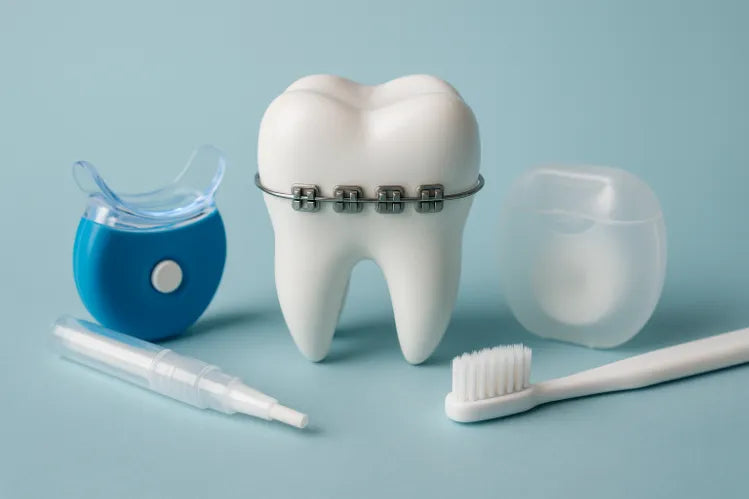
Table of Contents
- Best Toothbrush for Braces: It's Not Just Any Brush
- Water Flosser for Braces: Your New Best Friend
- Interdental Brushes: Small But Mighty
- Braces Flossing Tools: Because Flossing Shouldn't Be a Puzzle
- Orthodontic Hygiene Essentials: Put It All Together
- Planning Ahead? Go Clear with ALIGNERCO
- Braces Cleaning Made Easier
- FAQs
Table of Contents
- Best Toothbrush for Braces: It's Not Just Any Brush
- Water Flosser for Braces: Your New Best Friend
- Interdental Brushes: Small But Mighty
- Braces Flossing Tools: Because Flossing Shouldn't Be a Puzzle
- Orthodontic Hygiene Essentials: Put It All Together
- Planning Ahead? Go Clear with ALIGNERCO
- Braces Cleaning Made Easier
- FAQs
Keeping your smile clean and your braces sparkling without having to go to the dentist!
If you wear braces, you're likely aware that having them is not only about getting straighter teeth, but also about maintaining your oral hygiene, sometimes on a higher level. Food can be sneaky, and plaque is just waiting for the chance to turn your mouth into a cesspool! Do not fear! With the right braces cleaning tools, you can keep your mouth fresh and healthy.
Best Toothbrush for Braces: It's Not Just Any Brush
Let’s get one thing straight: not all toothbrushes are created equal, especially when it comes to braces. The best toothbrush for braces is one that can navigate wires, brackets, and tight spaces.
Manual VS Electric?
Even though a soft-bristled manual toothbrush does the trick, many orthodontists suggest an electric toothbrush with an orthodontic head. It pulses and spins and can get into the crevices that plaque loves to hide in. You can't get easier than that - you are more likely to brush your teeth for the full two minutes since it's quick.
Pro Tip: It is best to angle the toothbrush at an angle of 45 degrees above and below the brackets to get the most clean.
Water Flosser for Braces: Your New Best Friend

If you haven't already been using a water flosser for braces, you are going to be blown away. A water flosser provides a pressurized stream of water that shoots out to blast away food substances and plaque without the awkward advance of threading your floss through the little archwires.
Water Flossers are especially useful for those who may have sensitive gums or who're simply short on time. If you use a water flosser just once a day, your mouth will feel as clean as it would after a professional dental cleaning!
Interdental Brushes: Small But Mighty

These small brushes are like mini cleaners, and they are lifesavers. Interdental brushes slip between your brackets and wires to clean where your toothbrush cannot.
You can use them during the day after meals, making them perfect for school, work, or on-the-go brushing emergencies. You can easily toss one (or a few) in your bag, and you are ready for anything.
Braces Flossing Tools: Because Flossing Shouldn't Be a Puzzle
Traditional floss and braces don’t exactly get along. That’s where braces and flossing tools come in. We’re talking about:
- Floss threaders: Simple plastic tools that help guide floss behind your wires.
- Orthodontic flossers: Pre-cut floss with a stiff end or built-in threader—perfect for quick flossing.
Planning Ahead? Go Clear with ALIGNERCO
If you're still weighing the options for straightening your teeth, clear aligners can be a viable choice. Companies like ALIGNERCO offer clear aligners that can produce excellent results with little maintenance and virtually invisible wear. You can look forward to a fantastic smile without wires, brackets, or the hassle of cleaning.
Home Dental Cleaning with Braces Made Easy
- Just because you have braces doesn't mean you have to deal with plaque and food stuck in your teeth every day. As long as you have the proper cleaning tools and you dedicate a small fraction of time every day, you can keep your mouth plaque-free and food-free from the comfort of your own home. Effective oral hygiene is important, for both aesthetic and functional purposes, so braces can do their job!
FAQs
1. How to clean teeth with braces at home?
Brush after every meal, use a water flosser, floss threader, or orthodontic flosser, and clean between brackets with an interdental brush.
2. What equipment is needed for braces?
You’ll need a soft toothbrush or electric toothbrush, an orthodontic flosser or a water flosser, and interdental brushes.
3. Is $5000 expensive for braces?
It’s within the typical range. Braces usually cost between $3,000 and $7,000, depending on the type and treatment length.
4. What is best to clean braces?
A combination of an electric toothbrush, water flosser, and interdental brush works best to clean around brackets and wires.
Citations:
Colgate. (n.d.-k). Protect your investment: How to clean braces. https://www.colgate.com/en-us/oral-health/early-orthodontics/protect-your-investment-how-to-clean-braces
Baltimore, O. (2019, November 21). A Guide to Cleaning Teeth with Braces. Orthodontic Associates. https://orthodonticassoc.com/braces/guide-cleaning-teeth-braces/






